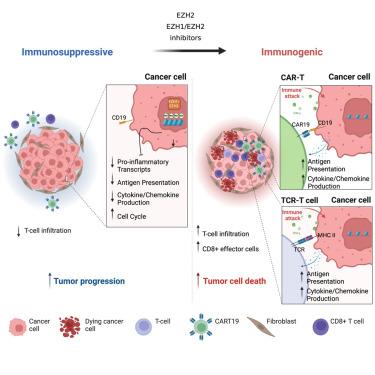EZH1/EZH2 inhibition enhances adoptive T cell immunotherapy against multiple cancer models
IF 48.8
1区 医学
Q1 CELL BIOLOGY
引用次数: 0
Abstract
Tumor resistance to chimeric antigen receptor T cell (CAR-T) and, in general, to adoptive cell immunotherapies (ACTs) is a major challenge in the clinic. We hypothesized that inhibiting the tumor drivers’ methyltransferases EZH2 and EZH1 could enhance ACT by rewiring cancer cells to a more immunogenic state. In human B cell lymphoma, EZH2 inhibition (tazemetostat) improved the efficacy of anti-CD19 CAR-T by enhancing activation, expansion, and tumor infiltration. Mechanistically, tazemetostat-treated tumors showed upregulation of genes related to adhesion, B cell activation, and inflammatory responses, and increased avidity to CAR-T. Furthermore, tazemetostat improved CAR- and TCR-engineered T cell efficacy in multiple liquid (myeloma and acute myeloid leukemia) and solid (sarcoma, ovarian, and prostate) cancers. Lastly, combined EZH1/EZH2 inhibition (valemetostat) further boosted CAR-T efficacy and expansion in multiple cancers. This study shows that EZH1/2 inhibition reprograms tumors to a more immunogenic state and potentiates ACT in preclinical models of both liquid and solid cancers.

求助全文
约1分钟内获得全文
求助全文
来源期刊

Cancer Cell
医学-肿瘤学
CiteScore
55.20
自引率
1.20%
发文量
179
审稿时长
4-8 weeks
期刊介绍:
Cancer Cell is a journal that focuses on promoting major advances in cancer research and oncology. The primary criteria for considering manuscripts are as follows:
Major advances: Manuscripts should provide significant advancements in answering important questions related to naturally occurring cancers.
Translational research: The journal welcomes translational research, which involves the application of basic scientific findings to human health and clinical practice.
Clinical investigations: Cancer Cell is interested in publishing clinical investigations that contribute to establishing new paradigms in the treatment, diagnosis, or prevention of cancers.
Insights into cancer biology: The journal values clinical investigations that provide important insights into cancer biology beyond what has been revealed by preclinical studies.
Mechanism-based proof-of-principle studies: Cancer Cell encourages the publication of mechanism-based proof-of-principle clinical studies, which demonstrate the feasibility of a specific therapeutic approach or diagnostic test.
 求助内容:
求助内容: 应助结果提醒方式:
应助结果提醒方式:


